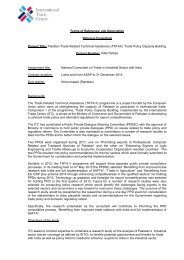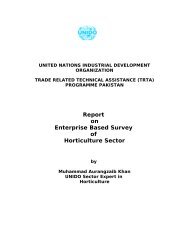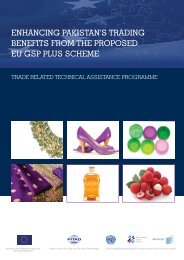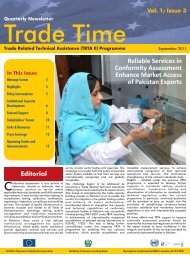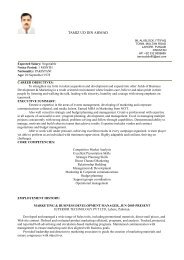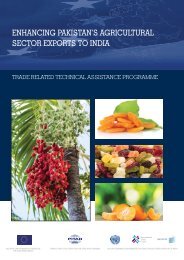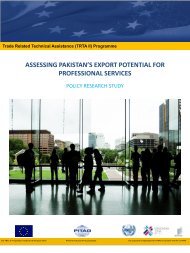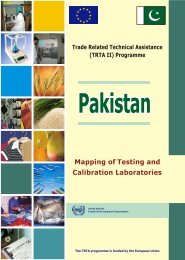Enhancing dairy sector export competitiveness - International Trade ...
Enhancing dairy sector export competitiveness - International Trade ...
Enhancing dairy sector export competitiveness - International Trade ...
You also want an ePaper? Increase the reach of your titles
YUMPU automatically turns print PDFs into web optimized ePapers that Google loves.
ENHANCING DAIRY SECTOR EXPORT COMPETITIVENESS IN PAKISTANprocessing enterprises. The model is characterized by the payment of relatively higherprices to the farmers to ensure the continued supply of milk.b) Vertically-Integrated Cooperative Setup: This model aims to ensure welfare of thefarmers in terms of productivity and income. Idara-e-Kissan (IK) is the only <strong>dairy</strong>cooperative operational in Pakistan based on this model. The milk is procured fromgeographically dispersed small farmers through a network of village milk collectors whoare also responsible for transportation of collected milk to the processing plants of HalaDairies 30 . The system is more focused on the provision of development-related livestockservices such as veterinary care, animal vaccination, artificial insemination, feedimprovement, extension and social services while it is less focussed on payment of highprices for milk to the farmers. Any village farmer can become a member of thisorganization if he/she owns at least one cow or buffalo. Although there is no membershipfee, however, the farmer should be able to supply at least 300 litres of milk in a six-monthtime period to benefit from the development services offered by the cooperative setup forthe next six months.As can be observed, both models rely heavily on the village milk collection agents or dodhis forprocurement of milk from farmers. The prices received by farmers are based on the weekly quotations formilk containing at least 6% fat by the processors. The quality of milk is tested by these agents and milk isthen transported to the milk collection centres of the processing companies. These centres are equippedwith the necessary chillers and other equipment that maintains temperature of milk at 2°C for the purposeof reducing the risk of contamination and spoilage. From this point, milk is transported to the processingplants through specialized storage trucks. The plants process the milk into UHT and pasteurized <strong>dairy</strong>products for supply to urban consumers. Although Idara-e-Kissan has been successful at organizing smallfarmers and vertically integrating its supply chain for processing of milk into <strong>dairy</strong> products by Halla, theimpact of the project has been limited due to its incapacity of reaching a large number of farmers scatteredin various parts of the country. According to estimates, the organization accounts for just 0.2 per cent ofthe total milk produced in Pakistan and only about 2 per cent of the total UHT/ Pasteurized milk in thecountry (Riaz, 2008). There is dire need to establish additional <strong>dairy</strong> cooperatives on the same lines ofIndia (Amul Dairy) where the concept has gained popularity and organized geographically dispersedfarmers effectively.Some of the private <strong>sector</strong> trade organizations that aim to bring together <strong>dairy</strong> farmers of the country andaddress their production and marketing related constraints include the Pakistan Dairy Association (PDA),Livestock Breeders and Dairy Farmers Association (LBDFA), Livestock Farmers and Breeders Association(LFBA) and Farmers Association of Pakistan (FAP).The Contract Dairy ModelAlthough the milk processing companies in the formal <strong>sector</strong> prefer to procure milk directly from thefarmers, they are forced to rely on the milk collection agents or dodhis due to the limited outreach of theircollection networks. The commercial processors enter into contracts with the rural dodhis or Village MilkCollectors (VMC) / contractors. In cases where the VMC centres have been set up by these companies,the village farmers can directly sell milk to these contractors who are available during morning and eveningtimes.The VMC has no discretionary price-setting power in this case and has to purchase milk from the farmerson the price set by the processor based on the 6% fat content criteria on a weekly basis. In addition to this,the VMC receives a commission for collecting, storing and transporting milk to the processor’s collectioncentres. The VMC is a self-employed person and operates under the supervision of the village council thathas the powers to dismiss him as well. The VMC has to be vigilant of the quality of milk as it is tested againat the collection centres and if the fat content or milk quality falls short of the required standards, the milk isreturned and any financial implications must be faced by him only.30 Halla is a popular <strong>dairy</strong> brand name in Pakistan which is marketing pasteurized milk and <strong>dairy</strong> products.31



